When something is used or broken it usually ends up in the trash can. What most of us don’t realize is that lots of these things are classified as “hazardous household waste,” meaning it’s actually dangerous to throw them away. Disposing of household hazardous waste properly starts by knowing where your nearest HHW facility is. Use 1800Recycling to find local recycling and disposal options for just about anything you can think of.

Wikipedia
Batteries – even used up ones – are FULL of nasty chemicals that can infiltrate the water supply system and cause serious health and environmental risks if they end up in the landfill.Take any and all rechargeable batteries to your nearest RadioShack or BatteriesPlus for safe, free recycling. What if the batteries aren’t rechargeable, aka alkaline? Drop them off at the nearest Household Hazardous Waste (HHW) facility.
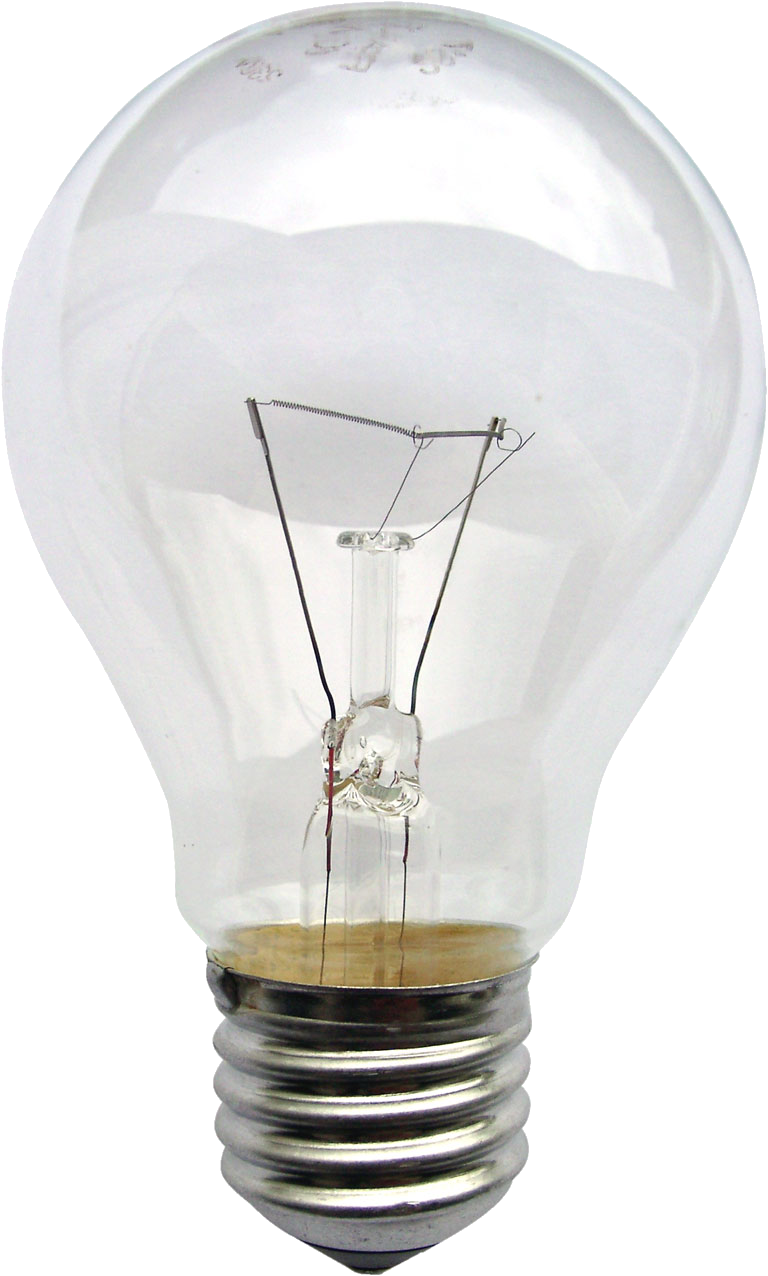
Wikimedia
Incandescent and halogen light bulbs can’t be recycled, but are considered non-toxic, so those you can toss.Fluorescent bulbs (including those curly CFLs) contain toxic chemicals, and should never go in the trash can. Some large retailers — like Home Depot and IKEA — offer CFL recycling services for bulbs purchased through them. Or you can search RecycleABulb.com for local disposal options. Most LEDs are safe and can be recycled–check the packaging for details. Recycleabulb
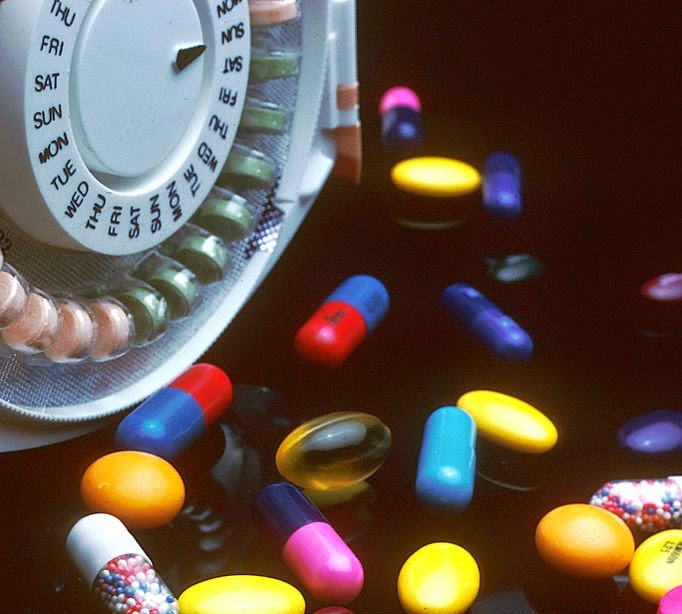
Wikimedia
Unused meds? You might be tempted to flush them down the toilet, dump them down the drain, or empty the bottle in the trash. DON’T. Doing so allows these powerful drugs to leach into the soil and water supply, where they can wreak havoc with the environment. Instead, search takebackyourmeds.org for a drug take-back event in your area. Takebackyourmeds

Wikimedia
Spray cans contain propellants and chemicals that make them unsafe to throw away (especially if there are little bits left in the can). Since it’s hard to be sure whether they’re empty or not, take them to your local HHW facility to be safe.

Wikipedia
Digital cameras, computers, televisions, printers, iPods, MP3 players, mobile phones and chargers, DVDs, CDs, video and audio tapes, pagers, ink cartridges, and other electronics–all of this e-waste contains dangerous substances like mercury, lead, cadmium, beryllium, and brominated flame retardants. Not to mention valuable rare earths like gold, silver, and platinum.Find responsible e-waste recyclers at e-Stewards.org, or use a buy-back program offered through the manufacturer. E-stewards
.jpg)
Wikimedia
Hair is full of nitrogen. Add it to your compost pile to help create cheap fertilizer for your non-edible plants. I’ve also heard you can sprinkle it around garden plants to keep deer away. If you’re cutting off 10 or more inches of hair at once (and it’s not bleached) consider donating it to Locks of Love. Locks of Love

Wikimedia
If you pour these into the trash while they’re still hot, it will wreck the bag and create a nasty mess. Even solidified, it can still cause gross problems at the waste processing facility. Pouring them down the drain is an even worse idea.Bacon fat can be strained into a jar and saved in the fridge as a substitute cooking oil. Small amounts of other oil can be placed in tightly sealed, unbreakable containers in your everyday trash, or taken to a collection center in your area (it’s often recycled into auto fuel!).

Wikimedia
Leftover paint, paint thinners, stains, and paint strippers (and the brushes or rollers that touched them!) are flammable and poisonous, and should be taken to a local household hazardous waste collection center. An alternative is to let the paint can dry out by leaving the lid off. When the can is empty (and completely dry), it can be recycled at a scrap metal facility.

Gulfcoastequinepet
Using chemical-based pesticides, herbicides, and fertilizers is terrible for the environment and I strongly urge you to consider non-toxic alternatives. But if you DO use these chemicals, never put them in the garbage or pour them down the drain. The best way to deal with leftovers is to give them to someone who will use it. Otherwise, take it to the nearest Household Hazardous Waste facility.
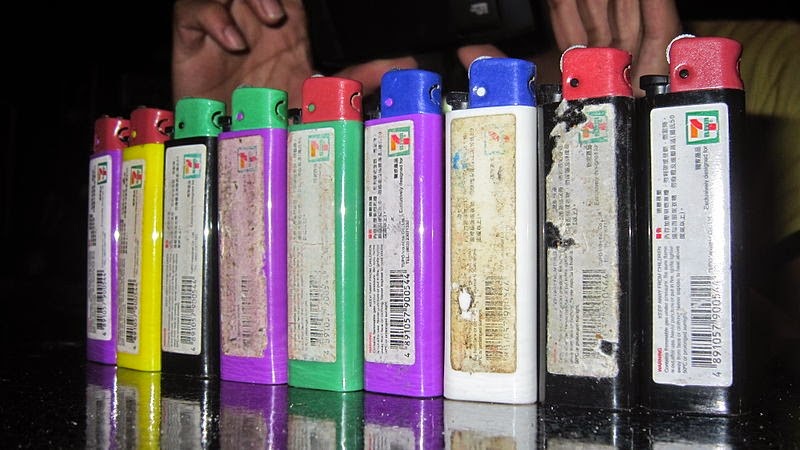
Wikimedia
Plastic lighters with even a little fluid leftover are flammable hazards, so make sure they’re completely drained before trashing. You can, however, save yourself some money by refilling Bic lighters (how-to linked below). Partially full or Butane lighters are hazardous, and should only be disposed of at a HHW facility. Ehow

Preserve Products
Brita filters are awesome until they’re all used up. Instead of throwing that big, expensive filter in the trash, send it in to Preserve Product’s recycling program or drop it off at one of their convenient collection locations.

epa.gov
Wikimedia
Those old fashioned mercury thermometers contain 500 milligrams of mercury, which can become a health hazard if the thermometer is accidentally broken (as often happens with things thrown in the trash). If you’re upgrading to a digital model, take the old one to the nearest household hazardous waste facility. If it breaks in your house, follow the link below for EPA directions on how to clean up.
.jpg)
Greencotton.wordpress
Plasticfilmrecycling
Even if you’re using paper or fabric bags at the grocery store, plastic bags can still creep into your life. While many (including Ziploc bags) CAN be recycled, most municipal recycling programs aren’t set up to handle them.To properly dispose of these, and all other packaging made of plastic film, search www.plasticfilmrecycling.org to find a convenient drop-off location.
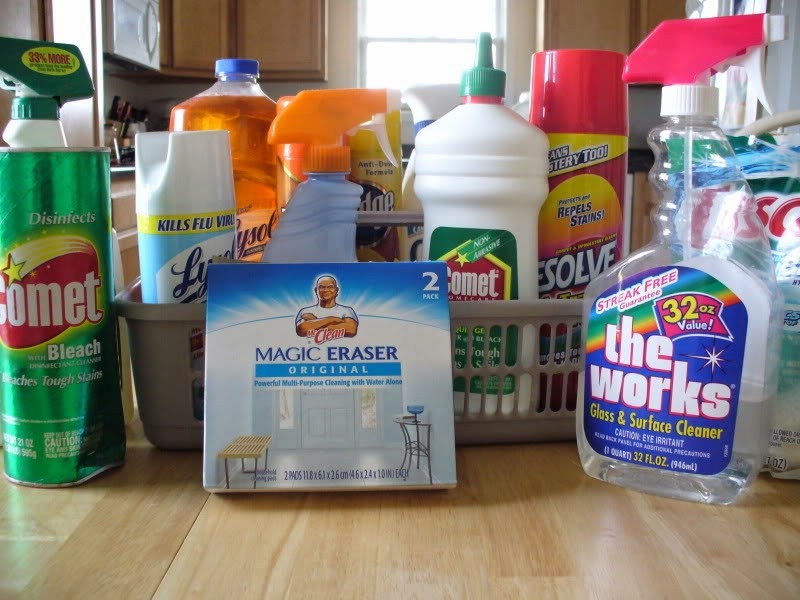
Goodwifeinthekitchen.blogspot
Groovygreenlivin
Unless you make your own, or only buy organic, your cleaning supplies are chock full of hazardous chemicals. Flushing cleaning supplies down the toilet runs the risk of corroding your pipes and is guaranteed to poison the fishes and wildlife on the receiving end. If you’re not going to use them up, take them to a household hazardous waste facility for safe disposal.

incosmetics.co.uk
Conventional cosmetics contain chemical substances that are not removed by water treatment, so flushing them is detrimental to the water supply. Even when empty, cosmetic containers can’t be recycled due to the blend of materials that they’re made of.Fortunately, there are cosmetic recycling programs. Take containers from used cosmetics — regardless of brand — to any Origins store (or Origins counter in a department store), or Aveda, M.A.C, and Kiehl’s, and they’ll be recycled responsibly.
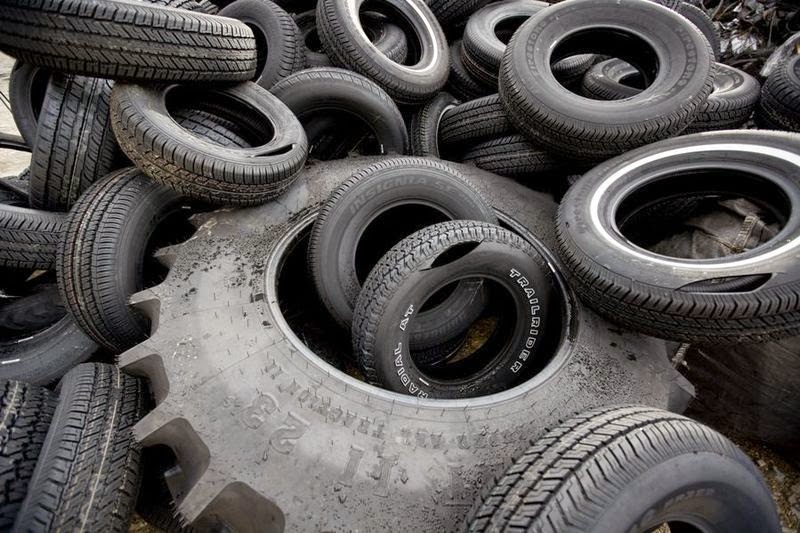
Wikimedia
It’s illegal to throw tires in the garbage or dump them along the roadside. The steel-belt inside auto tires can puncture the liners of landfills, leading to ground contamination. Old tires are not considered hazardous waste, but if they are not properly recycled, they do pose threats. Tires can be recycled at almost any car dealer or tire service center, or you can pay your trash hauler to pick them up.
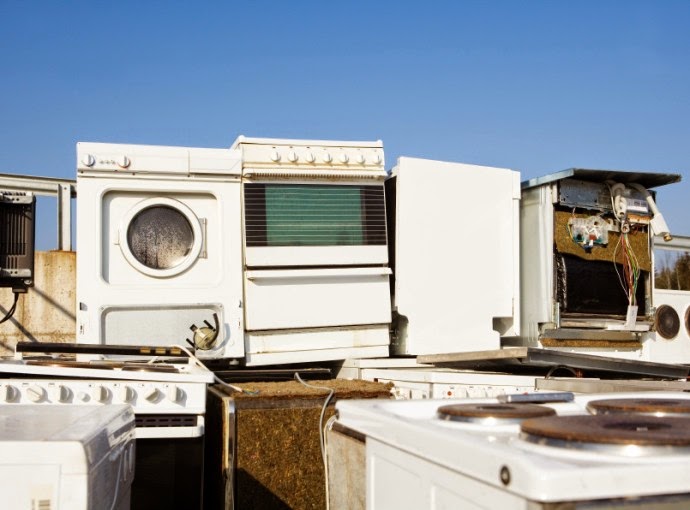
Blog.allstate
Used and broken appliances (like refrigerators, air conditioners, and freezers) contain refrigerants, insulating foams and other substances that are harmful if released into the atmosphere. Donate them to charity or take them to a facility that recycles appliances.
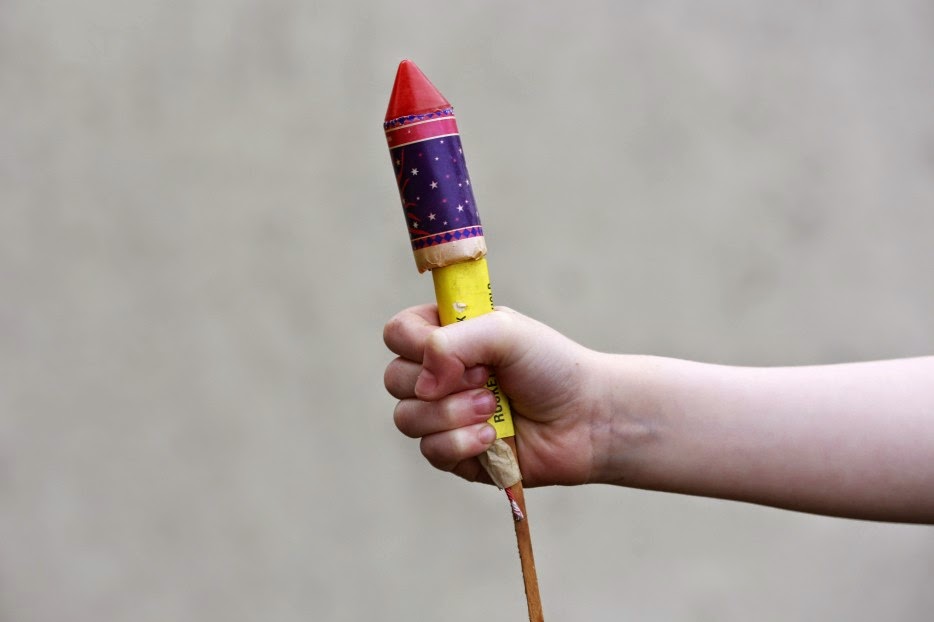
Businessinsider
The reason not to throw dud or otherwise unexploded fireworks in the trash should be obvious. Small quantities of household fireworks that are damaged or unexploded should be soaked in water overnight. Then, immediately take the duds out of the water and place them in a plastic garbage bag. In some cases, local police and fire departments will also dispose of them for you.

figurefixer.blogspot
Because they contain solvents and other toxic chemicals, glues and adhesives can’t be disposed of in their original form. Either let them dry completely (just like paint and stain) or spread thin layers on cardboard or newspapers and allow to dry before tossing. As always, you can also take to a HHW facility.
Source: InspireAmaze
Related:
1. Batteries

Wikipedia
Batteries – even used up ones – are FULL of nasty chemicals that can infiltrate the water supply system and cause serious health and environmental risks if they end up in the landfill.Take any and all rechargeable batteries to your nearest RadioShack or BatteriesPlus for safe, free recycling. What if the batteries aren’t rechargeable, aka alkaline? Drop them off at the nearest Household Hazardous Waste (HHW) facility.
2. Light bulbs

Wikimedia
Incandescent and halogen light bulbs can’t be recycled, but are considered non-toxic, so those you can toss.Fluorescent bulbs (including those curly CFLs) contain toxic chemicals, and should never go in the trash can. Some large retailers — like Home Depot and IKEA — offer CFL recycling services for bulbs purchased through them. Or you can search RecycleABulb.com for local disposal options. Most LEDs are safe and can be recycled–check the packaging for details. Recycleabulb
3. Unused or expired prescription drugs

Wikimedia
Unused meds? You might be tempted to flush them down the toilet, dump them down the drain, or empty the bottle in the trash. DON’T. Doing so allows these powerful drugs to leach into the soil and water supply, where they can wreak havoc with the environment. Instead, search takebackyourmeds.org for a drug take-back event in your area. Takebackyourmeds
4. Aerosol cans

Wikimedia
Spray cans contain propellants and chemicals that make them unsafe to throw away (especially if there are little bits left in the can). Since it’s hard to be sure whether they’re empty or not, take them to your local HHW facility to be safe.
5. Computers and electronics

Wikipedia
Digital cameras, computers, televisions, printers, iPods, MP3 players, mobile phones and chargers, DVDs, CDs, video and audio tapes, pagers, ink cartridges, and other electronics–all of this e-waste contains dangerous substances like mercury, lead, cadmium, beryllium, and brominated flame retardants. Not to mention valuable rare earths like gold, silver, and platinum.Find responsible e-waste recyclers at e-Stewards.org, or use a buy-back program offered through the manufacturer. E-stewards
6. Hair (human and pet)
.jpg)
Wikimedia
Hair is full of nitrogen. Add it to your compost pile to help create cheap fertilizer for your non-edible plants. I’ve also heard you can sprinkle it around garden plants to keep deer away. If you’re cutting off 10 or more inches of hair at once (and it’s not bleached) consider donating it to Locks of Love. Locks of Love
7. Bacon fat or cooking oils

Wikimedia
If you pour these into the trash while they’re still hot, it will wreck the bag and create a nasty mess. Even solidified, it can still cause gross problems at the waste processing facility. Pouring them down the drain is an even worse idea.Bacon fat can be strained into a jar and saved in the fridge as a substitute cooking oil. Small amounts of other oil can be placed in tightly sealed, unbreakable containers in your everyday trash, or taken to a collection center in your area (it’s often recycled into auto fuel!).
8. Paints and stains

Wikimedia
Leftover paint, paint thinners, stains, and paint strippers (and the brushes or rollers that touched them!) are flammable and poisonous, and should be taken to a local household hazardous waste collection center. An alternative is to let the paint can dry out by leaving the lid off. When the can is empty (and completely dry), it can be recycled at a scrap metal facility.
9. Lawn and garden chemicals

Gulfcoastequinepet
Using chemical-based pesticides, herbicides, and fertilizers is terrible for the environment and I strongly urge you to consider non-toxic alternatives. But if you DO use these chemicals, never put them in the garbage or pour them down the drain. The best way to deal with leftovers is to give them to someone who will use it. Otherwise, take it to the nearest Household Hazardous Waste facility.
10. Lighters

Wikimedia
Plastic lighters with even a little fluid leftover are flammable hazards, so make sure they’re completely drained before trashing. You can, however, save yourself some money by refilling Bic lighters (how-to linked below). Partially full or Butane lighters are hazardous, and should only be disposed of at a HHW facility. Ehow
11. Brita water filters

Preserve Products
Brita filters are awesome until they’re all used up. Instead of throwing that big, expensive filter in the trash, send it in to Preserve Product’s recycling program or drop it off at one of their convenient collection locations.
12. Glass thermometers

epa.gov
Wikimedia
Those old fashioned mercury thermometers contain 500 milligrams of mercury, which can become a health hazard if the thermometer is accidentally broken (as often happens with things thrown in the trash). If you’re upgrading to a digital model, take the old one to the nearest household hazardous waste facility. If it breaks in your house, follow the link below for EPA directions on how to clean up.
13. Plastic bags (including Ziploc storage bags)
.jpg)
Greencotton.wordpress
Plasticfilmrecycling
Even if you’re using paper or fabric bags at the grocery store, plastic bags can still creep into your life. While many (including Ziploc bags) CAN be recycled, most municipal recycling programs aren’t set up to handle them.To properly dispose of these, and all other packaging made of plastic film, search www.plasticfilmrecycling.org to find a convenient drop-off location.
14. Cleaning supplies

Goodwifeinthekitchen.blogspot
Groovygreenlivin
Unless you make your own, or only buy organic, your cleaning supplies are chock full of hazardous chemicals. Flushing cleaning supplies down the toilet runs the risk of corroding your pipes and is guaranteed to poison the fishes and wildlife on the receiving end. If you’re not going to use them up, take them to a household hazardous waste facility for safe disposal.
15. Cosmetics

incosmetics.co.uk
Conventional cosmetics contain chemical substances that are not removed by water treatment, so flushing them is detrimental to the water supply. Even when empty, cosmetic containers can’t be recycled due to the blend of materials that they’re made of.Fortunately, there are cosmetic recycling programs. Take containers from used cosmetics — regardless of brand — to any Origins store (or Origins counter in a department store), or Aveda, M.A.C, and Kiehl’s, and they’ll be recycled responsibly.
16. Tires

Wikimedia
It’s illegal to throw tires in the garbage or dump them along the roadside. The steel-belt inside auto tires can puncture the liners of landfills, leading to ground contamination. Old tires are not considered hazardous waste, but if they are not properly recycled, they do pose threats. Tires can be recycled at almost any car dealer or tire service center, or you can pay your trash hauler to pick them up.
17. Old appliances

Blog.allstate
Used and broken appliances (like refrigerators, air conditioners, and freezers) contain refrigerants, insulating foams and other substances that are harmful if released into the atmosphere. Donate them to charity or take them to a facility that recycles appliances.
18. Unexploded fireworks

Businessinsider
The reason not to throw dud or otherwise unexploded fireworks in the trash should be obvious. Small quantities of household fireworks that are damaged or unexploded should be soaked in water overnight. Then, immediately take the duds out of the water and place them in a plastic garbage bag. In some cases, local police and fire departments will also dispose of them for you.
19. Glue and adhesives

figurefixer.blogspot
Because they contain solvents and other toxic chemicals, glues and adhesives can’t be disposed of in their original form. Either let them dry completely (just like paint and stain) or spread thin layers on cardboard or newspapers and allow to dry before tossing. As always, you can also take to a HHW facility.
Source: InspireAmaze
Related:
- I’ve Seen People Turn Garbage Into Some Cool Stuff. But THIS…. This Is Absolute Brilliance.
- Models of Sustainability: Sweden Runs Out of Garbage
- 20 Year Old Claims He Can Rid the World’s Oceans Of Plastic
- 19 year old Develops Ocean Cleanup Array That Could Remove 7,250,000 Tons Of Plastic From Oceans
- Floating Seawer Skyscraper Rids The World’s Oceans Of Plastic While Generating Clean Energy
- Seed Bombers Can Plant An Entire Forest of 900,000 Trees A Day!














COMMENTS